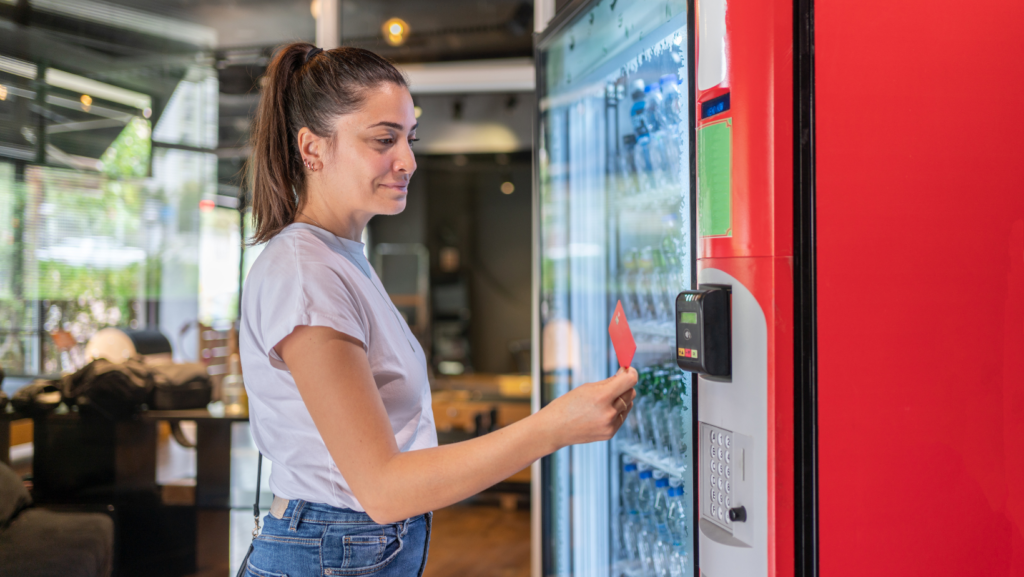Looking for a easy side hustle? Think about diving into the vending machine world!
Now, vending machines don’t just offer chips and soda. You can find healthy snacks, electronics, and pharmacy items too. It’s a potential side hustle or full-time gig with good earnings.
Here’s what you need to know to get started.
Benefits of a Vending Machine Business
Starting a vending machine business can be manageable and profitable, whether you have a few machines or a few hundred.
The startup cost is mainly just for the machines and stocking them—no need for office space.
Plus, you only need to maintain the machines by doing repairs, restocking, and collecting money from transactions

Steps for Starting a Vending Machine Business
Step 1: Choose Your Business Structure
The key to starting a vending machine business is acquiring a few machines. To expand and manage profits properly, and to claim business expenses on taxes, setting up an LLC or corporation is necessary.
You may also require a license for this business in your area. Once you determine if a business license is needed to own and operate vending machines, you can organize all necessary paperwork and smoothly start your business.
Step 2: Find Your Product
Food vending machines are common and straightforward, but there are also options for bulk item vending machines or those offering specialty products.
For food vending, consider selecting a theme for your machines. Offering healthy snacks in schools could be a lucrative option as schools prioritize providing nutritious options for students.
Step 3: Find the Right Location
Depending on the types of machines you have, you can begin by finding space in commercial establishments and mapping out a route. Since either you or an employee will be responsible for refilling and repairing the machines, it’s advisable to start with locations nearby.
As your business grows and you hire more staff, you can expand your coverage area.
Placing vending machines in local businesses requires building connections with business owners and promoting your services. For contracts with school districts or businesses with multiple locations, reaching out to regional managers or those handling larger-scale location management is essential.
Step 4: Choose the Right Type of Machine for Your Business
There are three types of vending machines: bulk, mechanical, and electronic.
Bulk machines dispense a single product in bulk, usually for a quarter or a dollar. You often find these in restrooms, providing items like sanitary products. They typically cost between $50 to $200 to start.
Mechanical machines, commonly found in break rooms, offer multiple products. They require an initial investment of around $2,000 but yield higher profits compared to bulk machines.
Electronic vending machines are the most advanced. They cost at least $3,000 each and often feature touch screens and accept credit card payments. The more variety of drinks and food offered, the higher the machine cost.
They are incredibly reliable and intuitive, and the ability to use a credit card often means they receive a lot of business as fewer people carry cash and coins—just make sure you choose a payment gateway that doesn’t charge exorbitant fees.
Step 5: Find the Right Market
Your vending machine should be strategically placed to cater to your target customers. For instance, vending machines offering microwavable foods and meal-like options thrive in locations where people spend extended periods without cooking facilities, such as offices, hospitals, and universities.
Snack vending machines are ideal for offices as well. Alternatively, if you’re interested, vending machines selling novelty trinkets or small candies can succeed in specialty small businesses.
Lastly, vending machines dispensing medicine or electronics are perfect for placement in airports, highway rest stops, or train stations. These items are essential for travelers, potentially yielding high profits.
Step 6: Stock Your Products
In some states, regulations require a specific percentage of healthy options in food vending machines. Ensure you have access to sources for healthy snacks if this applies to your area.
When sourcing food items in general, establish connections with wholesale suppliers to secure the lowest cost per unit. Saving on upfront food costs can increase your vending machine profits over time.

How To Purchase Vending Machines
For maximum flexibility in starting your business, purchasing your own vending machine and finding locations yourself is recommended. Leveraging your contacts in buildings and commercial spaces can help kickstart your venture effectively.
Alternatively, you can acquire an existing fleet of vending machines. Before proceeding, gather as much information as possible about why the owner is selling their route. If it’s due to retirement, it’s an ideal situation. However, if there are issues with the locations, it’s crucial to be aware of them.
Opting for a franchise offers the advantage of having an established business with fewer initial decisions to make. However, keep in mind that the franchisor takes a percentage of the franchisee’s earnings.
Repairs and Maintenance
Because vending machines are placed in public areas, they are vulnerable to vandalism and occasional theft. Despite being frustrating, it’s essential to incorporate this risk into your business plan.
Even if you purchased new vending machines rather than used ones, regular spot checks are necessary to ensure their security. Any downtime in your vending machines results in lost profit. Scheduling regular checkups of your machines will contribute to better overall profits.
My Top 5 Tips for Starting Your Own Vending Machine Business
As many of you know, I got my first start in business by buying a vending machine when I was 16 years old. With my dad’s help and tons of research – I ended up growing my vending business to operating over 10 machines throughout my city.
#1: Embrace What Sets You Apart
I’ve found that tapping into niche markets is where the magic happens. Think about what makes your vending machine business stand out.
For me, it was delving into niche products like artisanal snacks or specialty beverages. By catering to specific tastes or dietary preferences, you not only capture a dedicated customer base but also set yourself apart from the competition.
#2: Seek Synergy in Locations:
One of my secrets to success has been forging strategic partnerships with existing businesses. It’s all about finding locations that complement your offerings.
For instance, teaming up with gyms to provide post-workout protein bars or setting up shop in coworking spaces where professionals crave convenient snacks. It’s a win-win scenario that boosts visibility and sales.
#3: Put Customers First, Always:
In this business, the customer experience reigns supreme. I’ve invested heavily in making sure my vending machines not only deliver top-notch products but also create memorable interactions. From sleek interfaces to eye-catching displays, every detail is crafted with the customer in mind. It’s all about fostering that connection and building lasting loyalty.
#4: Accept all payment options:
One of my main pieces of advice is to accept all payment options. Alot of people do not carry around cash anymore so in order to beat your competitors, invest in a quality card reader to put on your machine.
This will give you a one-up on your competitors in the area.
#5: Commit to Sustainability:
As someone who cares deeply about the planet, sustainability isn’t just a trend—it’s a core value. That’s why I’ve made it a priority to incorporate eco-friendly practices into my business. From sourcing biodegradable packaging to using energy-efficient machines, every choice reflects my commitment to the environment. It’s not just good for the planet—it’s good for business too, attracting like-minded customers who appreciate our shared values.
By embracing these personal insights and strategies, I’ve been able to build a thriving vending machine business that not only stands out in a crowded market but also makes a positive impact on both customers and the planet.

Wrapping Up
So, wrapping things up, getting into the vending machine business could be a real money-maker if you play your cards right. Understanding the different types of vending machines out there and thinking about where you want to put them can really boost your chances of doing well.
You’ve got to deal with rules and stuff, like getting the right permits and licenses, especially for selling food. And hey, making friends with wholesale suppliers can save you some serious cash and make you more money down the road.
Whether you’re buying your own machines, taking over someone else’s bunch, or joining a franchise, you gotta do your homework and be smart about it. And don’t forget about keeping your machines safe from jerks who might try to mess them up.
If you’re serious, plan it out, work hard, and focus on keeping your customers happy, starting a vending machine business could turn into a sweet gig that keeps on giving.
Frequently Asked Questions
The cost varies depending on factors such as the number of machines, types of products, and location. Typically, startup costs range from a few thousand dollars to tens of thousands of dollars. It includes expenses like purchasing or leasing machines, acquiring inventory, securing locations, and marketing.
Vending machines come in various types, including:
Snack vending machines
Beverage vending machines
Combo vending machines (offering both snacks and drinks)
Specialty vending machines (e.g., for ice cream, coffee, or fresh food)
Healthy vending machines (offering nutritious snacks and drinks)
Look for high-traffic areas with potential customers, such as office buildings, schools, airports, gyms, or shopping centers. Consider factors like foot traffic, demographics, and competition. It’s essential to secure permission from property owners or managers before placing your machines.
Finding profitable locations with high foot traffic.
Dealing with machine maintenance and technical issues.
Managing inventory and restocking efficiently.
Adapting to changes in consumer preferences and regulations.
Competing with other vending operators or nearby businesses.
Earnings vary based on factors like location, product selection, and machine efficiency. On average, a single vending machine can generate anywhere from a few hundred to a few thousand dollars in revenue per month. With multiple well-placed machines, some operators can earn substantial profits.
Yes, regulations vary by location and may include permits, licenses, health and safety standards, and tax obligations. It’s essential to research and comply with local laws and regulations governing vending machine businesses.
Choose high-traffic locations with a demand for your products.
Offer a diverse selection of products to cater to different preferences.
Keep machines clean, well-maintained, and stocked with fresh inventory.
Utilize technology like cashless payment options and remote monitoring for efficiency.
Regularly evaluate and adjust your business strategy based on performance and feedback.
While a vending machine business can be lucrative, it requires dedication, organization, and entrepreneurial spirit. Success depends on factors like location selection, product offerings, and customer service. It’s essential to thoroughly research and plan before diving into this business opportunity.





